Best Dog Food for French Bulldog they deserves nothing but the best when it comes to nutrition. You know Frenchie seems to have such specific dietary needs compared to other breeds? The charming, flat-faced companions require carefully selected food that addresses their unique physiological characteristics and potential health concerns.
French Bulldogs aren’t just any ordinary breed – they’re special they need distinct nutritional requirements that can make or break their overall health and happiness. From their sensitive stomachs to their tendency toward weight gain, choosing the right food for your Frenchie is like finding the perfect ones.
Understanding French Bulldog Nutritional Needs:
Unique Dietary Requirements of French Bulldogs.
French Bulldogs have evolved into indoor companions with relatively low exercise requirements, which means their metabolic needs differ significantly from more active breeds. Their compact, muscular build requires adequate protein to maintain muscle mass, while their lower activity levels mean they need fewer calories per pound than a Border Collie or German Shepherd.
Think of your Frenchie’s metabolism like a luxury sports car – it’s powerful but doesn’t need to run marathons. These dogs typically weigh between 20-28 pounds, and their caloric needs range from 550-750 calories per day for adults, depending on their age, activity level, and individual metabolism.
Their brachycephalic (flat-faced) structure also affects how they eat and digest food. The shortened airways can make eating more laborious, so kibble size and texture matter more than you might think. Large kibble pieces can be difficult for them to pick up and chew properly, while very small pieces might be inhaled rather than chewed.
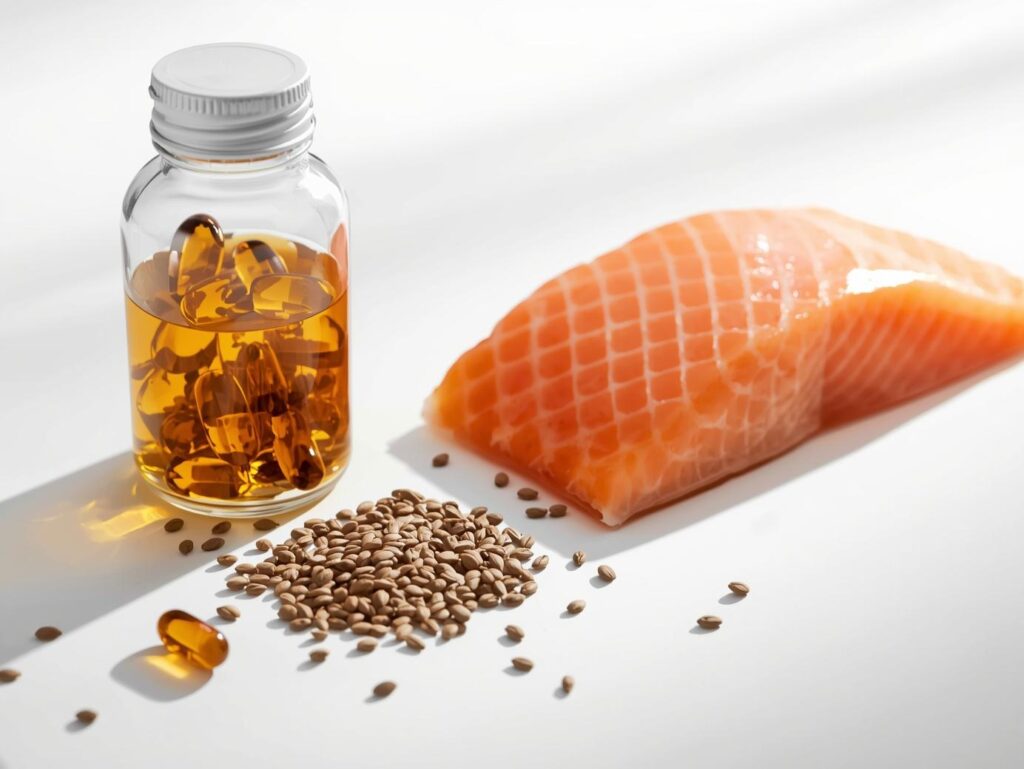
Common Health Issues That Affect Food Choices.
French Bulldogs are predisposed to several health conditions that directly impact their dietary needs. Hip dysplasia and joint issues are common, making weight management crucial to prevent additional stress on their skeletal system. It’s like carrying a heavy backpack – every extra pound makes the journey harder.
Allergies and skin sensitivities plague many Frenchies, often manifesting as itchy skin, ear infections, or digestive upset. Food allergies typically develop to proteins they’ve been exposed to repeatedly, with chicken, beef, and dairy being common culprits.
Brachycephalic Obstructive Airway Syndrome (BOAS) affects many French Bulldogs, making it essential to choose foods that won’t exacerbate breathing difficulties. Foods that cause excessive gas or bloating can put additional pressure on their already compromised respiratory system.
Key Ingredients to Look for in French Bulldog Food:
High-Quality Protein Sources:
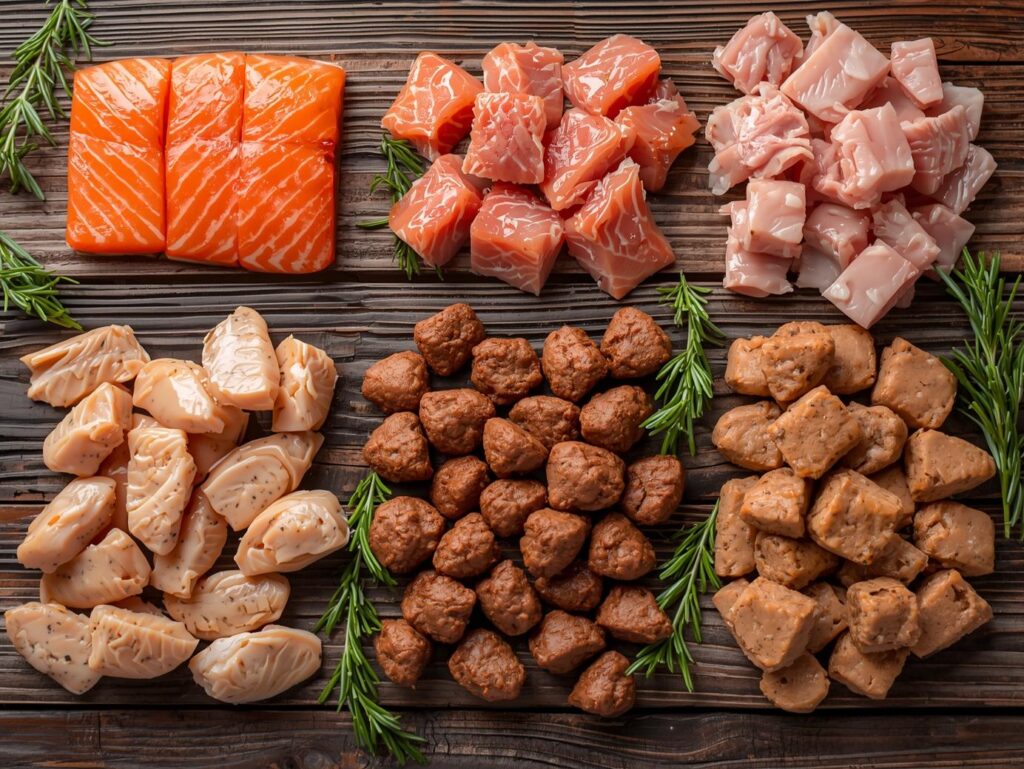
Protein forms the foundation of any good French Bulldog diet, but not all proteins are created equal. Look for named meat sources as the first ingredient – think “deboned chicken” or “salmon meal” rather than vague terms like “meat by-products” or “poultry meal.”
Novel proteins like duck, venison, or fish can be excellent choices for Frenchies with food sensitivities. These less common protein sources are less likely to trigger allergic reactions since most dogs haven’t been exposed to them extensively.
Essential Fats and Omega Fatty Acids.
Healthy fats aren’t just about calories – they’re crucial for skin health, coat quality, and overall well-being. French Bulldogs benefit from foods containing omega-3 fatty acids from sources like fish oil, flaxseed, or algae.
These essential fatty acids work like internal moisturizers, helping to combat the dry, itchy skin that plagues many Frenchies. EPA (Eicosapentaenoic Acid) and DHA (Docosahexaenoic Acid), specifically found in fish oils, also support joint health and can help reduce inflammation throughout the body.
Fat content should typically range from 12-16% for most adult French Bulldogs. Too little fat can lead to poor coat quality and skin issues, while too much can contribute to weight gain and digestive upset.
Digestible Carbohydrates.
While French Bulldogs don’t require carbohydrates in the same way they need proteins and fats, easily digestible carbs can provide steady energy and support digestive health. Sweet potatoes, brown rice, and peas are excellent options that provide fiber and nutrients without causing digestive distress.
Avoid foods heavy in corn, wheat, or soy, as these are common allergens and can be harder for sensitive French Bulldogs to digest. Think of carbohydrates as the supporting actors in your Frenchie’s nutritional drama – important, but not the star of the show
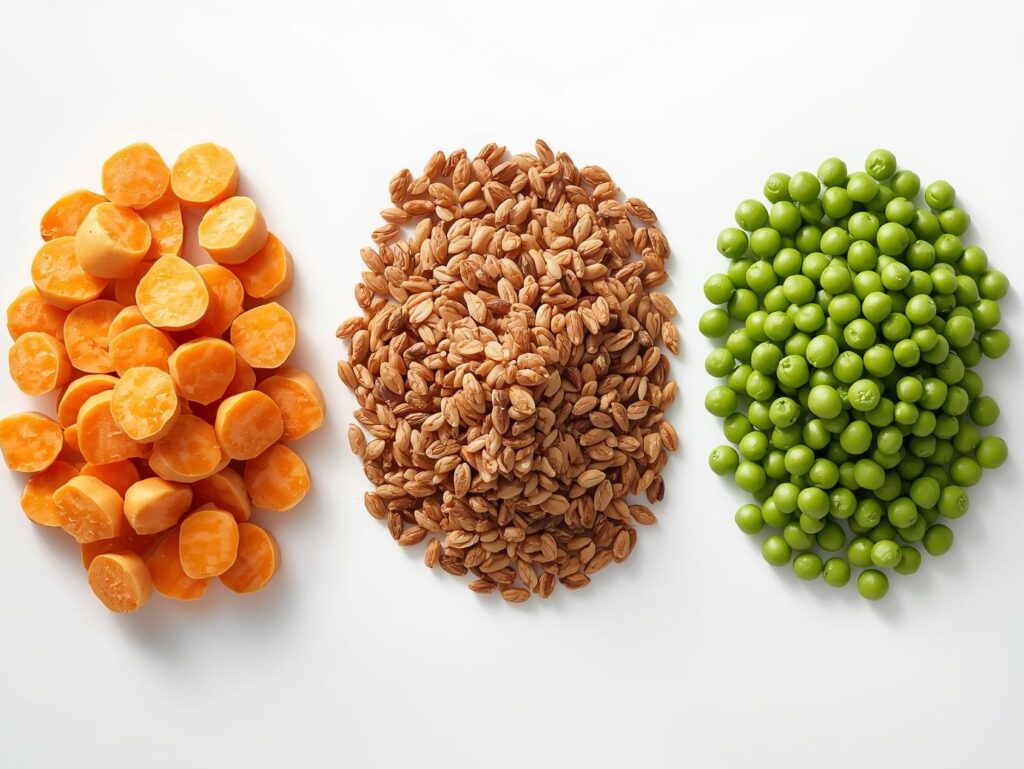
Prebiotics and Probiotics for Digestive Health.
French Bulldogs often have sensitive digestive systems, making gut health supplements incredibly valuable. Prebiotics feed the beneficial bacteria in your dog’s gut, while probiotics introduce helpful bacterial strains directly.
Look for foods containing ingredients like chicory root (a natural prebiotic), fermentation products, or added probiotic strains. These ingredients work together to create a healthy gut environment, which can improve digestion, boost immune function, and even affect your dog’s mood and energy levels.
Ingredients to Avoid in French Bulldog Food:
Common Allergens and Triggers.
French Bulldogs have earned a reputation for being sensitive souls, and their digestive systems often reflect this sensitivity. Chicken is surprisingly one of the most common allergens, despite being found in most commercial dog foods. If your Frenchie shows signs of food sensitivity, chicken-free formulas might be worth exploring.
Beef, dairy, eggs, and wheat round out the list of most common canine allergens. It’s like having a friend who’s allergic to everything at a potluck dinner – you need to read every label carefully and choose foods with limited, high-quality ingredients.
Artificial colors are completely unnecessary and can trigger sensitivities in some dogs. Your French Bulldog doesn’t care if their kibble is rainbow-colored – they’re much more interested in how it tastes and how it makes them feel.
Artificial Additives and Preservatives.
Chemical preservatives like BHA (Butylated Hydroxyanisole), BHT (Butylated Hydroxytoluene) and ethoxyquin have been linked to health concerns and should be avoided. Natural preservatives like tocopherols (vitamin E) and ascorbic acid (vitamin C) are much safer alternatives that still keep food fresh.
Excessive salt and sugar have no place in your French Bulldog’s diet. These ingredients are often added to make cheap foods more palatable, but they can contribute to obesity and other health issues over time.
By-products aren’t necessarily bad, but they should be specifically named (like “chicken liver” rather than “poultry by-products”) so you know exactly what your dog is eating.
Top 10 Best Dog Foods for French Bulldogs:
Premium Dry Kibble Options.
When selecting dry kibble for your French Bulldog, size matters more than you might think. Look for small to medium-sized kibble that’s easy for your Frenchie to pick up and chew without straining their jaw or breathing.
Royal Canin French Bulldog Adult formula is specifically designed for the breed, with a kibble shape that makes it easier for flat-faced dogs to pick up and chew. The formula addresses common breed concerns like skin sensitivities and digestive issues.
Hill’s Science Diet Small Paws offers excellent nutrition in a size appropriate for French Bulldogs. Their formulas are backed by extensive research and veterinary recommendations, making them a reliable choice for pet parents who want science-based nutrition.
Blue Buffalo Life Protection Formula provides high-quality protein with their “LifeSource Bits” – a blend of antioxidants, vitamins, and minerals specifically chosen to support immune system health, life stage requirements, and a healthy oxidative balance.
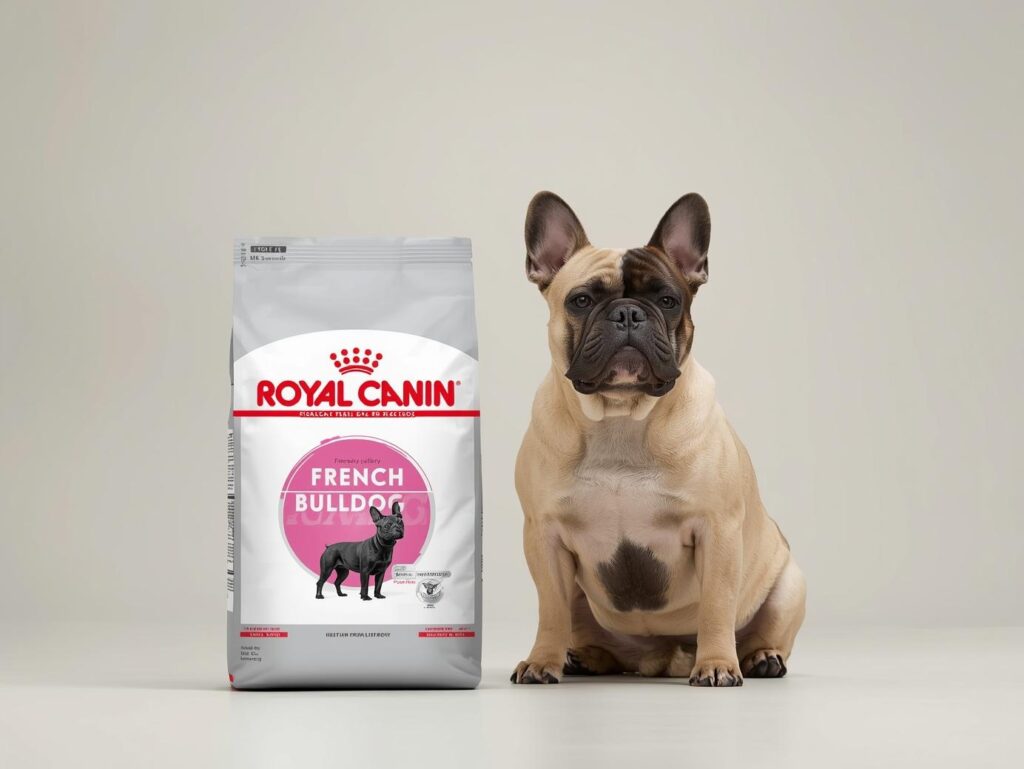
Wet Food Recommendations.
Wet food can be an excellent option for French Bulldogs, especially those who struggle with adequate water intake or have difficulty chewing dry kibble. The higher moisture content supports kidney health and can make meals more appealing to picky eaters.
Merrick Grain-Free Real Chicken & Sweet Potato Recipe provides high-quality protein with easily digestible carbohydrates. The smooth pâté texture is perfect for French Bulldogs and doesn’t require extensive chewing.
Wellness CORE Natural Grain-Free offers multiple protein options, including novel proteins like duck and turkey that might be better suited for dogs with chicken sensitivities.
Grain-Free vs. Grain-Inclusive Options.
The grain-free trend has been popular, but recent research suggests that grain-inclusive diets might actually be healthier for most dogs. Unless your French Bulldog has a specific grain allergy, whole grains like brown rice and oats can provide valuable nutrients and fiber.
Grain-free doesn’t automatically mean better – many grain-free foods substitute legumes and potatoes for grains, which can be harder for some dogs to digest and have been linked to heart issues in certain cases.
Special Dietary Considerations for French Bulldogs:
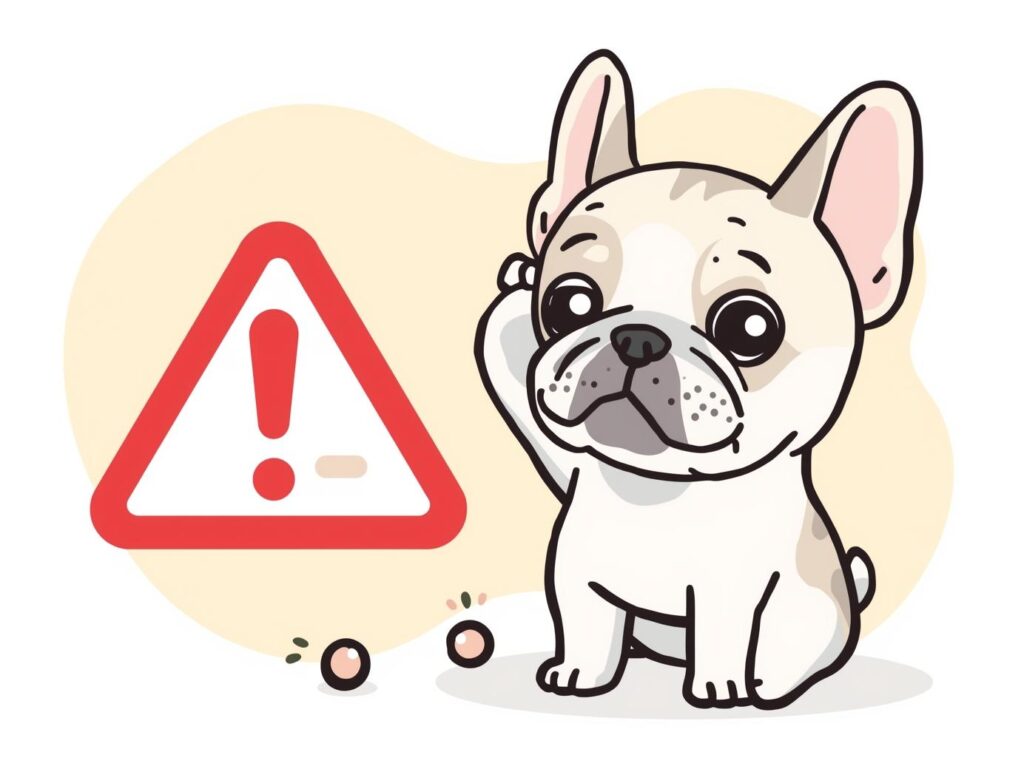
Food for French Bulldogs with Allergies.
If your French Bulldog suffers from food allergies, limited ingredient diets can be life-changing. These formulas contain a single protein source and a minimal number of other ingredients, making it easier to identify and avoid triggers.
Hydrolyzed protein diets take this concept even further by breaking down proteins into smaller components that are less likely to trigger allergic reactions. Think of it like cutting a large, recognizable key into tiny pieces – the immune system doesn’t recognize the fragments as threats.
Novel protein diets featuring unusual proteins like kangaroo, rabbit, or insect protein can provide complete nutrition while avoiding common allergens. While these might sound exotic, they’re often the key to helping allergic French Bulldogs thrive.
Weight Management and Portion Control.
French Bulldogs are notorious for their food motivation and tendency to gain weight easily. Their expressive eyes and charming personality make it difficult to resist sharing treats, but maintaining a healthy weight is crucial for their long-term health.
Weight management formulas typically contain fewer calories per cup while maintaining protein levels to preserve muscle mass. These foods often include added fiber to help your Frenchie feel satisfied without overeating.
Portion control is just as important as food quality. Even the best food in the world can cause weight gain if portions are too large. Most adult French Bulldogs need between 1/2 to 1 cup of food per day, divided into two meals.
Feeding Senior French Bulldogs.
As French Bulldogs age, their nutritional needs change significantly. Senior formulas typically contain fewer calories to account for decreased activity levels, while providing enhanced levels of joint-supporting nutrients like glucosamine and chondroitin.
Senior dogs may also benefit from foods with added antioxidants to support cognitive function and immune health. Think of these as nutritional insurance policies against the effects of aging.
Digestibility becomes even more important as dogs age, so senior foods often feature easily digestible proteins and prebiotics to support gut health.
Feeding Schedule and Portion Guidelines:
Puppy Feeding Requirements
French Bulldog puppies are like tiny growth machines – they need significantly more calories and nutrients per pound than adult dogs to support their rapid development. Puppy formulas provide the extra protein, fat, and calcium needed during this crucial growth phase.
Feed puppies three to four times per day until they’re about six months old, then transition to twice-daily feeding. This frequent feeding schedule helps prevent hypoglycemia (low blood sugar) and supports steady growth.
The transition from puppy to adult food should happen gradually around 12-15 months of age, when your Frenchie reaches their full adult size.
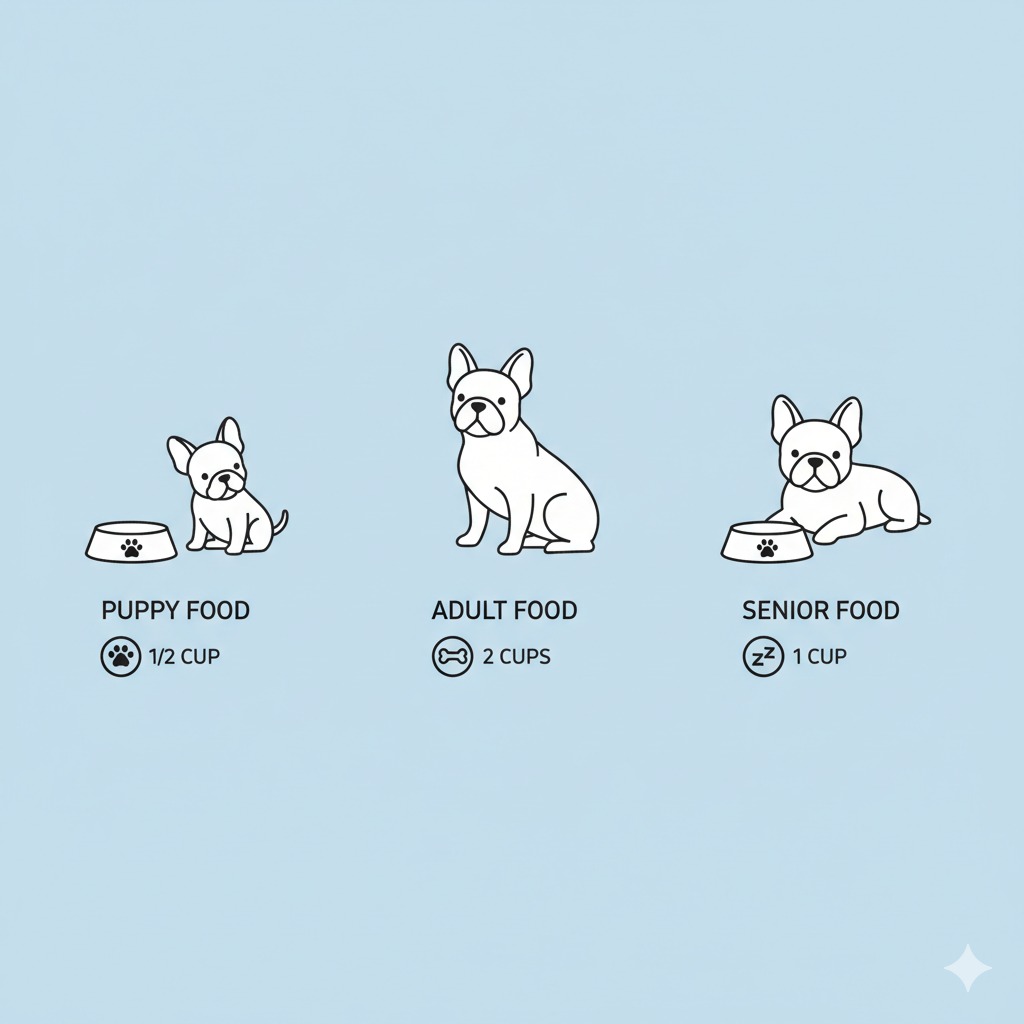
Adult French Bulldog Feeding Schedule.
Most adult French Bulldogs thrive on twice-daily feeding – once in the morning and once in the evening. This schedule helps prevent bloating and maintains steady energy levels throughout the day.
Free-feeding (leaving food out all the time) isn’t recommended for French Bulldogs, as they tend to overeat and it makes it harder to monitor their appetite and health.
Consistency is key – try to feed your Frenchie at the same times each day to establish a routine that supports healthy digestion and behavior.
Signs Your French Bulldog Needs a Diet Chang.
Your French Bulldog’s body will tell you if their current food isn’t working. Persistent itchy skin, frequent ear infections, or chronic digestive upset can all signal food sensitivities or allergies.
Changes in energy levels, coat quality, or bathroom habits can also indicate that it’s time to reassess your food choices. A dull, brittle coat might suggest inadequate fat content, while loose stools could indicate poor digestibility or food sensitivities.
Weight gain or loss without changes in portion sizes or exercise levels might mean the current food isn’t meeting your dog’s metabolic needs. Don’t ignore these subtle signs – they’re your Frenchie’s way of asking for help.
Budget-Friendly Options Without Compromising Quality.
Quality nutrition doesn’t always require breaking the bank. Several affordable brands offer excellent nutrition for French Bulldogs without the premium price tag.
Purina Pro Plan offers veterinarian-recommended nutrition at a moderate price point, with formulas specifically designed for small breeds and sensitive stomachs.
Wellness Complete Health provides balanced nutrition with quality ingredients at a more accessible price than some premium brands.
Remember that feeding a higher-quality food often means feeding less volume, which can offset the higher per-bag cost. It’s like buying concentrated laundry detergent – you use less but get the same results.
Homemade vs. Commercial Dog Food for French Bulldogs.
While homemade diets can be tailored to your French Bulldog’s specific needs, they require extensive knowledge and planning to ensure nutritional completeness. Commercial foods are formulated by pet nutrition experts and undergo feeding trials to prove their adequacy.
If you’re interested in homemade feeding, work with a veterinary nutritionist to develop balanced recipes. DIY (Do-It-Yourself) dog food is like performing surgery – theoretically possible, but best left to trained professionals.
Commercial foods offer convenience, consistency, and peace of mind that your Frenchie is getting complete and balanced nutrition with every meal.
Conclusion.

Choosing the best food for your French Bulldog doesn’t have to be overwhelming. Focus on high-quality protein, appropriate fat levels, and easily digestible ingredients while avoiding common allergens and unnecessary additives. Remember that every Frenchie is unique – what works perfectly for one dog might not suit another.
Pay attention to your dog’s individual responses to different foods, and don’t be afraid to make changes if their current diet isn’t working. Quality nutrition is one of the best investments you can make in your French Bulldog’s health and happiness.
The journey to finding the perfect food for your Frenchie might involve some trial and error, but the result – a healthy, happy, energetic companion – is worth every effort. Your French Bulldog depends on you to make the best choices for their nutritional needs, and armed with this knowledge, you’re well-equipped to do exactly that.
Frequently Asked Questions
Q1: How much should I feed my adult French Bulldog daily?
Most adult French Bulldogs need between 1/2 to 1 cup of high-quality dry food per day, divided into two meals. The exact amount depends on your dog’s age, weight, activity level, and the specific food’s caloric density. Always follow the feeding guidelines on your chosen food and adjust based on your
Q2: Can French Bulldogs eat grain-free dog food?
French Bulldogs can eat grain-free food, but it’s not necessary unless they have a specific grain allergy. Recent research suggests grain-inclusive diets may actually be healthier for most dogs. If you choose grain-free, ensure it’s from a reputable manufacturer and doesn’t rely heavily on legumes as the primary carbohydrate source.
Q3: What are the most common food allergies in French Bulldogs?
The most common food allergens for French Bulldogs include chicken, beef, dairy products, eggs, and wheat. Symptoms typically manifest as itchy skin, ear infections, digestive upset, or chronic paw licking. If you suspect food allergies, consult your veterinarian about elimination diets or
Q4: Should I feed my French Bulldog wet or dry food?
Q4: Should I feed my French Bulldog wet or dry food?
Q5: When should I switch my French Bulldog puppy to adult food?
French Bulldog puppies should typically transition to adult food around 12-15 months of age, when they reach their full adult size. Make the transition gradually over 7-10 days by mixing increasing amounts of adult food with decreasing amounts of puppy food to avoid digestive upset.

Pingback: Homemade Dog Food for Skin Allergies: 3 Recipe Tips & guide
Pingback: Best Dry Dog Food for Large Dogs with Grain (2025 Guide)
Pingback: Fresh Pet Dog Food for Diabetic Dogs: The Ultimate Guide to Managing Canine Diabetes Through Diet -